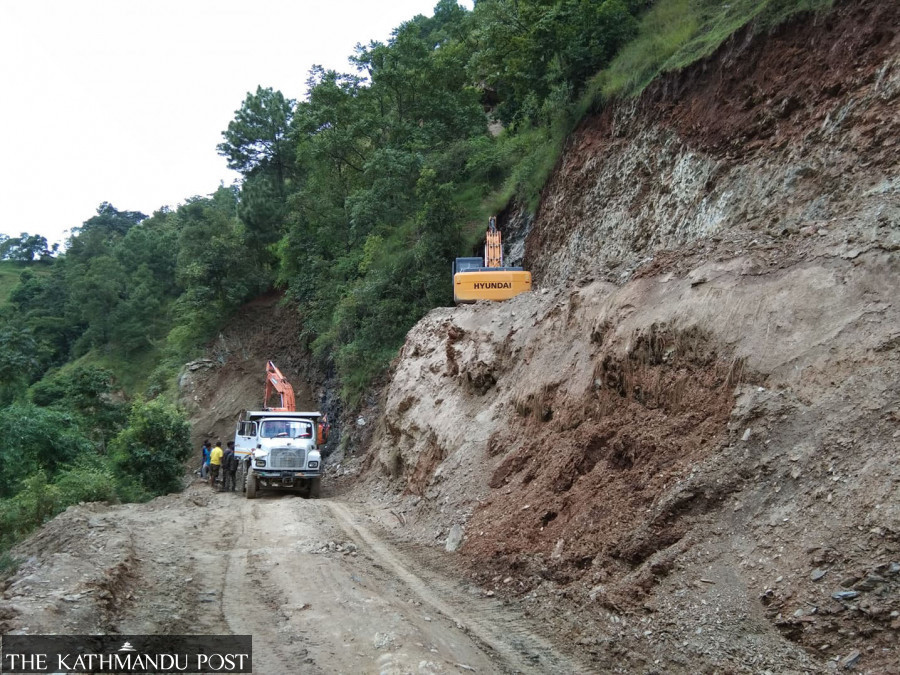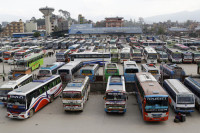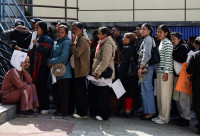National
Small road projects to be handed over to provincial and local governments
Roads Department officials have welcomed the move as a good step towards implementing federalism.
Prithvi Man Shrestha
Following a recent government announcement to either scrap or transfer around 1400 small road projects to provincial or local governments, officials are considering transferring the projects to sub-national governments. The government made the announcement in the replacement bill for the budget ordinance, which was passed by the lower house amid protest by the opposition on Monday. The bill still needs to pass through the upper house.
The government announced that the federal government would not immediately implement these projects, which are mostly smaller projects with budgets of just Rs 2.4 million each.
“Even under the new government, budgets for the projects have been allocated but not spent,” said Arjun Jung Thapa, director general at the Department of Roads. “Now, discussions are underway to hand over the projects to provinces and local governments along with the budget.”
He said they are awaiting instructions from the Ministry of Physical Infrastructure and Transport on how to hand the projects over to provincial and local governments.
Appendix 5 of the Constitution of Nepal says only the national highways come under the purview of the federal government. This means other roads and bridges should, in principle, be handled by provincial or local governments. But, instead of cutting down their numbers, successive federal governments have continuously been adding such projects.
For example, the erstwhile KP Sharma Oli-led government through the budget ordinance introduced on May 29 increased the number of local road projects to be implemented by the Department of Roads to 1,440 from 950 in the previous fiscal year, according to the Annual Programme 2021-22 unveiled by the Ministry of Physical Infrastructure and Transport. These projects are being implemented under two programmes—Road Infrastructure Development Programme and the Tarai-Madhes Road Infrastructure Special Programme. Also there are many other smaller projects under the Auxiliary Highway Development Programme under the federal government.
The government continued to place such projects under the federal government even though it has been six years since the promulgation of the new constitution, which requires the federal government to handle only the national highways.
“The new government’s move to either scrap or hand over the projects to sub-national governments would be a step in the right direction to implement federalism,” said Thapa.
The Department of Roads had announced a plan to hand over these projects, some of which are under construction, to the provincial and local governments in the last three years. However, citing practical difficulties in transferring several of the projects that were contracted out by the roads department, the federal government has decided to hand over such projects to provincial and local governments only after their completion.
In the past, there had been an administrative effort to hand over smaller projects to sub-national governments. This time, however, the announcement has been made at the political level through the spending bill, whose future is hanging in balance due to protests by the CPN-UML.
Before introducing this measure, the Finance Ministry had asked the roads department to stop work on the projects whose contracts had not been awarded.
“If the government is honest to the spirit of the constitution, this is the right time to hand over the small projects to provinces and local governments,” said Mukti Gautam, former deputy director general at the Department of Road. “It would be a welcome move if the government made the announcement to implement federalism. But, similar other projects should not be brought under the federal government in lieu of the existing projects.”
But, the government in the replacement bill has added around 200 new road projects for implementation by the roads department even though it suspended the implementation of 1,400 projects, according to Thapa.
“The detailed project reports (DPRs) for most of these new projects have yet to be prepared. But, these are relatively bigger projects with allocations ranging from Rs20 million to Rs60 million,” he said.
Current and former officials of the roads department say smaller roads and bridge projects are brought under the department under pressure from federal ministries and lawmakers.
“The politicians do this to show their voters that they did something in their constituencies,” said Gautam. “So, they pressure the federal government into implementing such projects through the department.”
He said even small drinking water and irrigation projects have been brought under the federal government agencies under pressure from politicians.
Officials at the roads department say inclusion of such projects in the federal budget has resulted in the waste of time, energy and scarce human resources of the roads department.
“Whether projects are big or small, the DPR process is time consuming,” said Shiva Prasad Nepal, spokesperson at the Department of Roads. “If such small projects are removed from the road department’s projects list then we could mobilize our staff in more important projects.”
With the federal, provincial and local governments all implementing local road projects, there has been a massive increase in the number of such projects across the country and many of them are being constructed without following standard construction procedure. “Particularly, the roads dug in the hilly areas without proper geological study have caused landslides and flooding,” said Nepal.




 14.09°C Kathmandu
14.09°C Kathmandu














